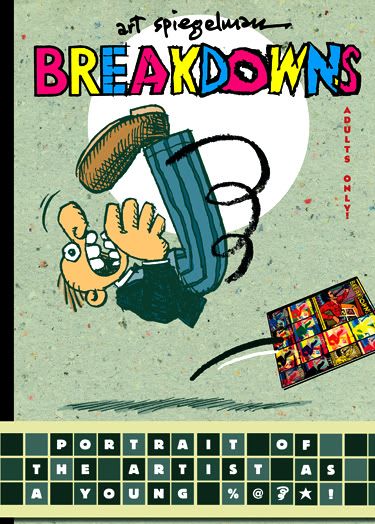 One of my uncles surprised me today with this book, Breakdowns by Art Spiegelman, which, according to the back cover blurb is "the legendary and long out-of-print 1978 collection of comics by Art Spiegelman, Pulitzer Prize-winning author of Maus." So while I was a 10-year-old geek obsessed with Star Wars, Battlestar Galactica and Micronauts comics, the cognoscenti were reading Spiegelman's amalgam of funny cartoon drawings, repurposed newspaper art, cubism, expressionism and the original 3-page "Maus."
One of my uncles surprised me today with this book, Breakdowns by Art Spiegelman, which, according to the back cover blurb is "the legendary and long out-of-print 1978 collection of comics by Art Spiegelman, Pulitzer Prize-winning author of Maus." So while I was a 10-year-old geek obsessed with Star Wars, Battlestar Galactica and Micronauts comics, the cognoscenti were reading Spiegelman's amalgam of funny cartoon drawings, repurposed newspaper art, cubism, expressionism and the original 3-page "Maus."I haven't finished reading it, but I have paged through it and the breadth of Spiegelman's art styles has already impressed me. But I was most affected by a couple of small details in the at-times emotionally harrowing autobiographical introduction. Foremost is a scene where young Spiegelman is trying to draw Tubby, only to have his father ask him to come help pack for vacation. It turns into a lesson in space management that comes into sharp relief when the father discovers Art is engrossed in his funny book and snatches it away, shouting, "It's important to know to pack! Many times I had to run with only what I can carry!" It's easy to understand why.
I'm reminded of Hungarian physicist Leo Szilard, also a Jew. He managed to escape Europe in the 1930s, but according to P.D. Smith's Doomsday Men: The Real Dr. Strangelove and the Dream of the Superweapon, Szilard developed the lifelong habit of staying largely in hotel rooms with a packed suitcase always at the ready. It's important to know to pack.
The elder Spiegelman's Holocaust memories suffuse his son's recollections of childhood, and this becomes more apparent in two other episodes-- one where the family is returning home after a party where a former member of the Sonderkommando continues to be socially snubbed and another where Art is working on the first "Maus" and visits with his father's now elderly friends and they jibe each other over whether one's Siberian gulag was a "country club compared to Auschwitz." It's even referenced in minor moments, such as the day Spiegelman dreams of owning a dog and his mother replies, "Even before Auschwitz your father was afraid of dogs."
Obviously, it was an omnipresent theme in the Spiegelman house, informing even later tragedies. As trite and weathered an observation as it is, I can't help but wonder if these things become your inheritance in the same way your mom's hair or your father's mouth or both of their mannerisms and concerns repeat themselves in you. Almost genetically. Both my parents lived through the Depression, but my father, having been born the year it began, bore the marks of growing up dirt-poor the rest of his life. And so now so do I, unlike a lot of my friends who had Boomers as parents and so have a kind of carelessness to their optimism.
You know, despite almost all of them being on the anti-anxiety medications I've eschewed because I'm too far gone to even ask for help.
Anyway, I really had only the most basic knowledge about Art Spiegelman and his work, and now I've got this gorgeously designed and art-rich-- in full color-- book to experience. It's one of the best gifts I've received in a long time!

No comments:
Post a Comment